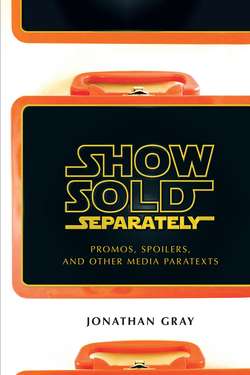Show Sold Separately

Реклама. ООО «ЛитРес», ИНН: 7719571260.
Оглавление
Jonathan Gray. Show Sold Separately
About NYU Press
Show Sold Separately
Contents
Acknowledgments
Introduction
Of Texts, Paratexts, and Peripherals: A Word on Terminology
The Movie of the Trailer
Where Is Springfield? Placing The Simpsons
An Overview of the Book
1. From Spoilers to Spinoffs
Watching on a Hope and a Prayer
“Only Hype”: From Soda to Soderbergh
What Is a Text?
Getting into a Program: Entryway Paratexts
“We Interrupt This Broadcast”: Paratexts In Medias Res
Wear the T-Shirt, Skip the Film: Paratextual Superiority
2. Coming Soon!
Hype, Promos, and Trailers: “A Cinema of (Coming) Attractions”
The Poster and Its Prey: Movie Posters and the Beginning of Meaning
Six Degrees of Promotion
Trailers and Their Sweet Hereafters
The Twenty-Second Text: Opening Credit Sequences and “Proper” Interpretations
Conclusion: More Show than the Show Itself?
3. Bonus Materials
The Doctors’ Rounds: Becoming the Real Deal
The Extra Texts, Bonus Texts, and Ideal Texts of DVDs
Fellowships of the Disc
The Aura of the Ring
The Return to Celluloid Hobbiton
The 4.7-Inch Diameter Canvas: DVDs and Televisual Art
Resurrecting the Television Author
Paratextual Turn-Offs and Turn-Ons
4. Under a Long Shadow
A Return to Middle Earth: Pre-Viewing Lord of the Rings (with Bertha Chin)
The Ten-Ton Balrog in the Room: King Kong and The Chronicles of Narnia: The Lion, The Witch, and the Wardrobe
A Dark Shadow over Gotham: Batman Begins
Sharing the Island with Others: J. J. Abrams and Collective Knowledge
Managing the Textual Realm
5. Spoiled and Mashed Up
Viewer Cartographies, Routes, and Marginalia
No Crying over a Spoiled Lost (with Jason Mittell)
“The Ultimate Close Reading”: Vidding Character and Relationship Studies
“You” and Your Limits: Privileged Paratexters
Moving the Goal Posts: Press Reviews and Friday Night Lights
A Paratext of Their Own
6. In the World, Just Off Screen
Learning to Use the Force: Star Wars Toys and Their Films
Die in the South Pole or Live in the North: Licensed Videogames
Playing Your Own Games
What Happens in Piedmont Stays in Piedmont: The Alternate Reality Game’s Dual Address
Rules for Play
Conclusion
The Dark Knight’s Pepperoni Pizza: Unincorporated Paratexts
“360°” Storytelling: Incorporated Paratexts
“In the Bloodstream”: Producing Paratexts
In the DNA
Notes. INTRODUCTION
CHAPTER 1
CHAPTER 2
CHAPTER 3
CHAPTER 4
CHAPTER 5
CHAPTER 6
CONCLUSION
Index
About the Author
Отрывок из книги
Thank you for buying this ebook, published by NYU Press.
Sign up for our e-newsletters to receive information about forthcoming books, special discounts, and more!
.....
The Onion News Network’s short clip plays with the notion of continuing paratexts, too, for in its suggestion that the integrity of the trailer might be jeopardized by the movie, the clip reflects on how each new iteration of a text—wherever it may be, and of whatever length (ninety seconds or ninety minutes)—can affect the public understanding of, appreciation of, and identification with that text. Quite simply, a “bad” adaptation will inevitably affect the public standing of a text, just as would a “good” one. But to be able to call an adaptation “good” or “bad” requires an audience member or community to have developed a notion of the ideal and proper text, and in this book I will argue that paratexts play as much of a role as does the film or television program itself in constructing how different audience members will construct this ideal text.
Another illustrative example lies in the army of merchandise and spinoff products that surround The Simpsons. The Simpsons is, of course, one of the world’s most successful television programs worldwide, having produced more than four hundred episodes by the time of writing. But surely few if any know The Simpsons solely as a television program, for it is also a brand, a world, and a set of characters that exist across clothing, toys, videogames, a film, ads, books, comics, DVDs, CDs, and many other media platforms. For the purposes of my argument here, though, I wish to focus on one particular platform: a set of online ads for The Simpsons Game (2007). Since this videogame followed in the wake of The Simpsons Movie (2007), in effect we have a third-level paratext: an ad for the game that followed the movie of the television program. As such, if we were to examine this as media studies has more traditionally examined such products, we would focus on it wholly as a hypercommercialized money-grab, as a synergistic attempt to squeeze as much as possible from a successful media product. Ads for games of a movie of a television show rate low on most traditional scales of artistic value.
.....